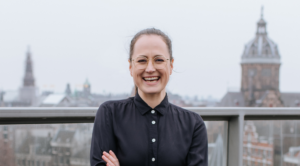New Digital Age (NDA), in association with LiveRamp, is meeting the men and women championing a data-led revolution in the marketing industry. ‘Meet the Revolutionaries’ focuses on the efforts of the industry executives helping to push digital marketing into a new era of data collaboration.
Here, Samantha Taylor, Head of Performance Marketing at British Gas explains the challenges of innovation inside a large organisation…
Tell me about your current role.
I started my career in a digital marketing role for a private health and fitness chain, and spent five years there, focusing mostly on paid search, then later on display and social campaigns. I then joined British Gas in a digital marketing role, driving acquisition of our HomeCare product, before being promoted to a senior marketing manager position.
I took a sidestep for a year or so to concentrate on marketing tech and make sure our tech stack was ready for the cookieless, first-party data era of digital marketing. When Google delayed the deprecation of third-party cookies, priorities changed and I moved back into management of our digital marketing team. I supported the Marketing Director to break down the traditional silos between the various marketing teams within the business and to instill more of a performance mindset across the whole team, which led me to my current role as Head of Performance Marketing.
In my role, I manage the performance resource across all the portfolio of products, with the Marketing Communications Leads leaning into my team for resource requirements and work closely with me to build and define strategies for each of the products. That gives me full visibility of everything we’re doing, end-to-end, from core overarching strategy all the way through to delivery.
Tell me of a time when you personally helped to drive innovation.
I’ve been leading the way British Gas, as an organisation, uses first-party data for the past couple of years. We have nearly 10 million customers across both energy and services and are the market leader across most of our portfolios, meaning that previously we were serving our ads to quite a lot of our existing customers. By implementing our first-party data to suppress our existing customers from ad campaigns, we’ve been able to redirect 10% of media spend every year to better target acquisitions.
That was the first step in implementing our first-party data into our channels. Today, we are constantly asking how we can be more targeted and more personalised? How can we use data to put the customer first and deliver the right kind of messaging at the right time? One frequent challenge is that the data the marketing team needs sometimes sits elsewhere in the organisation. Ensuring that the relevant data can flow around in business in a timely and privacy compliant way is a key task for marketers right now.
What are the most common challenges to innovation?
Other than privacy, which is the continual challenge for anything to do with data, our biggest challenge with innovation at British Gas is the sheer size of the organisation. We employ around 20,000 people, so any sort of significant change requires a lot of different stakeholders to get onboard. Lots of people need to be involved, meaning listening to lots of opinions. You need to be resilient to keep driving things forward.
What tips can you offer to others trying to drive innovation in their own organisation?
For me, it’s about surrounding yourself with people that you trust and that are supportive but, also, that you can learn from. I’m humble enough to say that a lot of people in my team can run rings around me. They’re much more technically skilled than I am, and have a lot more experience in the hands-on, day-to-day of getting stuff done. That makes me better at my job, because I know I have them to lean on and learn from. Having a good support network means that, when you hit red tape situations, you have people you trust to bounce off, to find new ideas and different routes towards your goal.
Also, know your numbers. If you can go to the commercial director with clear data that indicates what could be achieved by trying something new, it becomes difficult for them to say no. Arm yourself with a robust business case that you really believe in.
Does the ongoing economic uncertainty make it harder to innovate?
It 100% makes it harder. British Gas as a brand is in the middle of that crisis. Every penny that we have right now is going towards improving customer journeys and driving brand growth. The appetite for risk is a lot less. People are canceling subscriptions at a higher than average rate, so we’ve had to adapt and change the way that we sell our products. A lot of our focus and energy recently has gone into adapting to new customer needs rather than driving new innovation.
How do you think digital marketing will evolve over the next few years?
This afternoon I have a meeting about AI. We’re starting to explore and test how that could work for us as a business. In general, digital marketers have always had the benefit of being able to track everything and being able to prove ROI within a short space of time. As we continue to shift to a ‘cookieless’ world, where customers are choosing not to be tracked online, digital marketers are going to start to see a lot of holes in their customer data. So, I expect the field of measurement will change massively.









